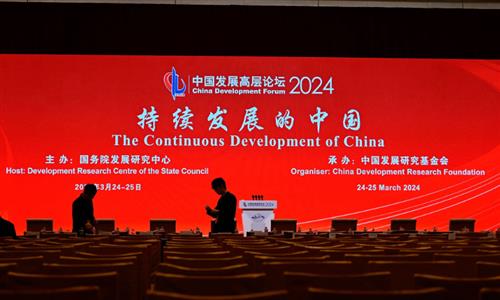China can ensure financial stability, won’t repeat Japan’s ‘lost decade’ housing bubble

Illustration: Chen Xia/Global Times
Downward pressure on China's real estate market has mounted, but its spillover effects on the real economy and financial system have been greatly exaggerated by Western media outlets, which reflects the West's lack of understanding of the country and its emotional resistance against China's rise.Nikkei Asia published an article on Tuesday, claiming China's "property crisis" is taking a "particularly heavy toll" on small banks in low-growth provinces, as bad debts to developers erode their finances.
Previously, Western analysts depicted Evergrande's financial woes as a "wrecking ball" for China's economy. Such efforts have fueled a new round of commentary about the "China collapse theory," which has repeatedly been struck down by reality.
China's real estate sector is indeed facing some downward pressure and challenges, but it remains resilient. In February, prices of newly built commercial residential properties in first-tier cities fell 0.3 percent from a month earlier. The real estate market remains generally stable despite price fluctuations.
In some developed economies, when real estate prices fluctuate, the impact may spread to the entire economy and have a huge impact. Examples included Japan's "lost decade" housing bubble in the 1990s and the US subprime mortgage crisis in 2008. However, the real estate market in China is different from the situations in Japan and the US at those times.
Tianfeng Securities analyst Song Xuetao wrote an op-ed article on Monday, headlined "China's real estate sector won't follow the old path of Japan." We suggest Western analysts should read the article, in which Song analyzed the demand structure and the financialization of China's real estate industry, as well as the loan-to-value ratio for Chinese residential mortgages.
Song said the slide in China's housing prices will be much milder than the decline in Japan, and, from the perspective of transmission risk, it will also be much milder than that in the US subprime mortgage crisis.
In the US in 2008, the collapse of real estate prices resulted in unprecedented losses of hedge funds, mortgage lenders and banks. However, China doesn't have a complex property derivatives market similar to the US. Although the memory of the US crisis is still fresh for many Western analysts, the same scenario won't play out in China, because the situation faced by the two countries is different.
First, although China's real estate market is facing downward pressure, the decline in housing prices is limited. More importantly, because of the slow development of financial derivatives, it will have a very limited spillover effect on the financial system.
Second, China is actively taking measures to stabilize the real estate market. For instance, under the "white list" mechanism launched in January, local authorities are recommending real estate projects eligible for financial support to financial institutions. This mechanism helps ensure the completion of quality real estate projects developed by companies that are distressed by debt issues.
Third, China's financial system is operating steadily and has strong resistance to risks. Multiple efforts have been made to improve the financial system, optimize financial services, and effectively forestall and defuse financial risks. Besides, Chinese households have high saving rates and low leverage levels, leaving sufficient space to cope with risks and challenges.
Fourth, the central government has enough tools to stabilize the real estate market and secure financial stability. In recent decades, China has maintained a stable financial system during a period of rapid economic expansion and significant structural reform. This has proved China's financial governance capability.
Pan Gongsheng, governor of the People's Bank of China, the central bank, said in March that China's property market is showing positive signs, with a solid foundation for long-term stable development and a limited impact on the financial system.
Despite the difficulties and challenges ahead, China is capable of ensuring financial stability and preventing systemic risk.
The author is a reporter with the Global Times. bizopinion@globaltimes.com.cn



